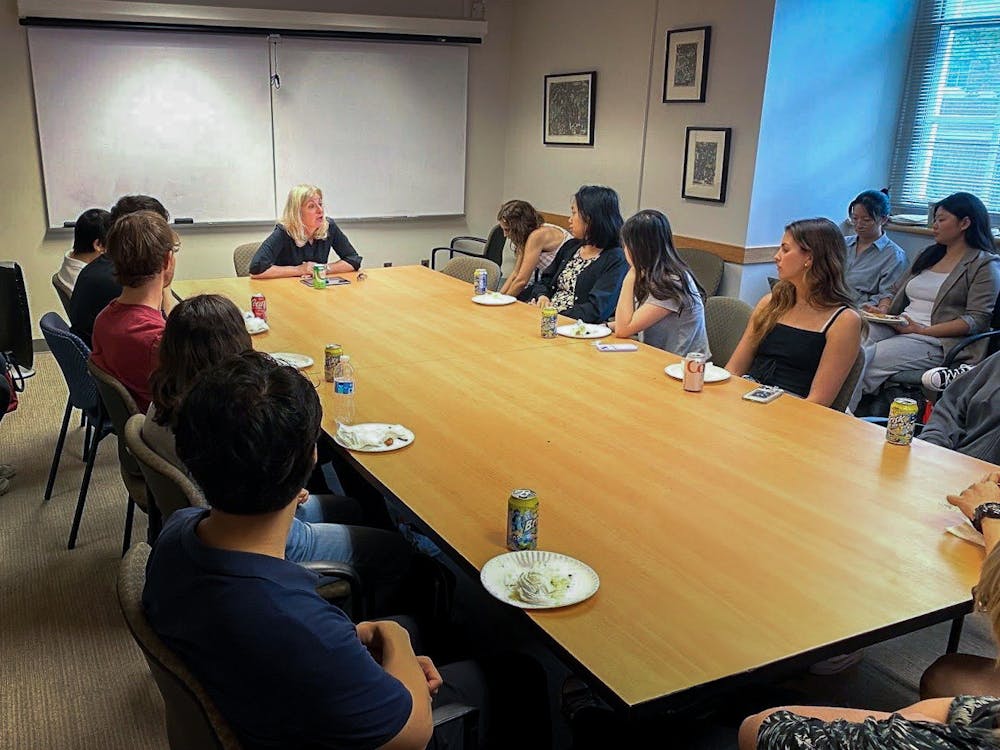The Aronson Center Speaker Series ended on Friday, Oct. 6 with Jennifer Luff, a professor from the Department of Political Science. Luff spoke on her past experiences and areas of study and introduced two new courses that she will begin teaching next semester.
Luff began by describing her introduction to unionized labor upon finding a job after college. The experience sparked her interest in researching American labor history. In particular, she was fascinated by the differences between working in a unionized company versus a non-union one.
“What struck me was that unionization really seemed to change the balance of power at that workplace in ways I had not expected,” she said. “People talk very openly about their salaries and about how to move up on the job. There were also a lot more African Americans in high-ranking positions than there had been [in my previous jobs].”
With her focus on labor history, Luff has worked at several institutions of higher education, including Durham University as an associate professor of history and Georgetown University as a research director for labor and the working poor. She has also held research fellowships at New York University and the University of California, Los Angeles.
In addition to her work on organized labor, Luff was a political organizer for the Al Gore 2000 presidential campaign and the John Kerry 2004 presidential campaign. She related that her experiences in politics introduced her to the field of civic engagement, which she has been pursuing ever since.
Luff then discussed her dissatisfaction with the limited scope of the study of labor history. As a graduate student, she found that labor history was mainly centered around leftist political movements and white male workers. This prompted her to broaden her scope of labor history and begin research into conservative and non-skilled labor movements.
“There was not a lot of research on workers [such as] cleaners or office workers,” she said. “What really did not feature in labor history was conservative workers. There was almost nothing about workers who had politically conservative views, let alone were part of political formations that were conservative.”
Luff also talked about her book Commonsense Anticommunism, published in 2012, during her time at Durham University. The work focuses on anti-communism within American labor movements starting in the 1890s.
In addition, Luff spoke about the two new courses she plans to teach next semester. One will be focused on the history of conspiracy in politics and the other is centered around the history of labor movements in the U.S.
Following the event, Luff stressed the importance of these two classes in an interview with The News-Letter.
“I think both these classes use these lenses, one of labor and one of conspiracy, to introduce students to big broad themes in American political economy,” she said. “[They will] ground students with questions like how the American state operates and how formations have shaped the American economy, or how conspiratorial thinking has been a constant, not something unusual, in American politics.”
In an interview with The News-Letter, sophomore Akshat Sinha, an International Studies major, commented that he found Luff’s focus on politics and labor unions especially engaging and showed interest in her course about conspiracy.
“My biggest takeaway is that, currently, it is a very tumultuous time, so the future of politics and labor unions is going to be quite decisive within government and international organizations,” he said. “I found the conspiracy in American politics really interesting because it’s a class from a perspective of human psychology meshed with politics.”
During the Q&A section of the event, Luff was asked about her views on various labor and union movements, including the influence of police unions and the role of trade unions in socialist states such as Vietnam. She emphasized her research into fields not typically covered in labor history and encouraged students to begin their own research.
Junior Tess Lepelstat, an International Studies and Economics major, expressed her interest in the academic study of labor in an interview with The News-Letter.
“I really liked our discussion about unions, as well as the dynamic between citizens versus academics,” she said. “As academics, we're able to critically analyze most opinions that people have and are therefore analysts — versus citizens, where we are just participating in public discussion.”

















